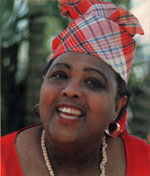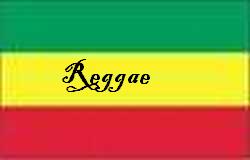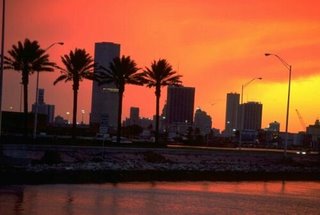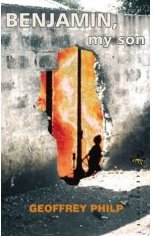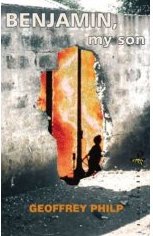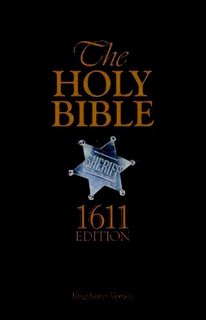 Westerns and the King James Version are two of the main staples of the Jamaican imagination. This is understandable because both share a similar plot and a cast of recognizable characters. The King James Version and most Westerns begin with trouble (original sin or “bad guys” in Dodge City), a “good guy” or hero emerges in the middle of the feud (Samson or Wyatt Earp), and an alignment of forces leads to a final showdown (OK Corral or Valley of Megiddo). The bad guys (Satan or the Clantons) are annihilated; the good guys win and ride off into the sunset on their white horses.
Westerns and the King James Version are two of the main staples of the Jamaican imagination. This is understandable because both share a similar plot and a cast of recognizable characters. The King James Version and most Westerns begin with trouble (original sin or “bad guys” in Dodge City), a “good guy” or hero emerges in the middle of the feud (Samson or Wyatt Earp), and an alignment of forces leads to a final showdown (OK Corral or Valley of Megiddo). The bad guys (Satan or the Clantons) are annihilated; the good guys win and ride off into the sunset on their white horses.
The fictions that have emerged from Jamaica also follow a similar pattern. But given the history of colonialism and racism in Jamaica, the stories sometimes parody the conventions. For example, in the classic Jamaican film,
The Harder They Come, there are clearly discernible “bad guys” (record producers) and a “good guy,” Ivan, a singer who is willing to make any sacrifice for his music. Because of the unfair treatment by the record producers, Ivan’s crimes begin small, but then escalate when he takes the law into his own hands. This leads to a showdown on a North Coast beach. To a certain extent, the actions that lead up to Ivan’s shootout with the police are inevitable because Ivan was thrust into an unjust system and given his temperament, the resulting bloodbath was to be expected. Yet, what is made clear in the film is that Ivan’s original sin was being born Black.
“I was born with a price on my head,” said Bob Marley in a 1978 interview (
Bob Marley in His Own Words by Ian McCann). It is interesting to note that Marley uses the language of the “Wanted” poster to describe an almost fatalistic viewpoint which seems uncharacteristic with his usual positive viewpoints and the teachings of Rastafari. Yet, both these themes are also evident in one of this most popular song, "I Shot the Sheriff.”
The song begins with the speaker already in trouble, “All around in my home town/ They are trying to track me down/ They say they want to bring me in guilty/ For the killing of a deputy/ For the life of a deputy.” The speaker knows the system is stacked against him because he is to be brought in “guilty” for a crime he would never deign to consider, “the killing of a deputy.” Deputies are not in his league. He knows he killed the “Sheriff” and it is a “capital offense.” But he has an explanation.
“Sheriff John Brown always hated me/ For what I don't know/Ev'ry time I plant a seed/ He said, "Kill it before it grows."/ He said, "Kill them before they grow." The anonymity of “Sheriff John Brown” makes it clear that the “Sheriff’s” influence is pervasive (almost like Agent Smith in
The Matrix), and the speaker’s plight has been brought about not by anything that he has done, but by the enmity that “Sheriff John Brown” has towards him for a Kafkaesque crime for which the speaker knows there is only one possible ending: death. The "seed" is metaphorical and could stand for any on the "dangerous" ideas that Rastafari espouse: humans as god or each human as ultimately responsible for his/her choices. These ideas would be a threat to any sytem of dominance and control represented in the Bible as Pharoah, Herod, or Nebuchadnezzar or in the speech of Rastafari as Rome or Babylon and would have to be "killed" or stopped before they could spread among the populace who would embrace these ideas of freedom. Something has to give.
The key to understanding the lyric comes in the final stanza: “Freedom came my way one day/ And I started out of town/ All of a sudden I saw Sheriff John Brown/ Aiming to shoot me down/ So I shot, I shot, I shot him down/ And I say, if I am guilty I will pay.” This was not a fight that the speaker wanted, but the situation was created by the “Sheriff.” The speaker was willing to leave, but the “Sheriff” was about to kill him, so he acted in self-defense. The speaker concludes his ballad with a complex blend of Rastafari and Jamaican mythology and folklore.
"The Sheriff," then represents the antithesis of freedom--the repressive codes of conduct that have been codified into laws that serve the oppressors and have been internalized as the "proper" codes of conduct. In Western mythology, it's the dragon that must be slain.
“Reflexes had the better of me/And what is to be must be/Ev'ry day the bucket a-go-a well/One day the bottom a-go drop out.” The speaker’s defense rests on his claim: “Reflexes had the better of me.” It is to be noted that within
Rastafarian mythology, for the Nya man of Africa, the natural, original man who lives in complete harmony with life and his surroundings, “reflexes” are not a crime (
Rastafari: An Ancient Tradition). Reflexes are part of his natural makeup and his right to self-hood is expressed in the concept of
InI—the mystical union of man with the divine. The Rastaman’s lifelong mission is to reflect the African Nya man in his choice of right foods and right actions (
Iwa in the Yoruba religion). In Bob’s vocabulary, Nya man could also be substituted for “higher man” (“We are the children of the higher man”)—the idea of the indwelling god (the
i-nity of InI) which is part of the West African religious continuum.
The speaker then says, “What is to be, must be,” and then counters with “Every day the bucket a go a well/ One day the bottom a go drop out.” Besides being another example of Marley’s lyrical balancing that is a trademark of his writing, “How long shall they kill our prophets/ While we stand aside and look/ Some say it's just a part of it/ We've got to fulfill the book,” he completes the circle with the folk wisdom of Jamaica, “Ev'ry day the bucket a-go-a well/One day the bottom a-go drop out,” and admits a kind of fatalism. However, it is a kind of fatalism that is driven by the actions of the persona. In other words, actions (desires) drive destinies. There are consequences to actions and any repeated action, “Ev'ry day the bucket a-go-a well,” is sure to bring about a certain consequence, “One day the bottom a-go drop out.” Is the hero’s destiny inevitable? We’re back to
The Matrix: “Ohh, what's really going to bake your noodle later on is, would you still have broken it if I hadn't said anything?”
In the framework of Rastafari mythology, politicians, the police and courts are lackeys of Babylon—the system of institutionalized racism/colonialism that values capital over labor. The “Sheriff,” then, would be the all encompassing externalized rules (in time, internalized which is where the real battle is fought) of Babylonian conformity--everything that if a Rastaman (Nya Man) is to be free, he must meet head-on and deny. The Rastaman asserts his dignity and right to live on moral grounds in a system that would deny his existence. The final showdown in the Valley of Megiddo or the town of
Gibbeah is inevitable.
The actions of the protagonist also match the themes within Marley’s other work because the protagonist is willing to fight against an enemy that threatens his physical or moral integrity “Brother you're right, you're right/ You're right, you're right, you're so right/We gonna fight, we'll have to fight/ We gonna fight, fight for our rights” (“Zimbabwe”). The speaker is not cowering in the shadow of the “Sheriff” nor is he willing to become a martyr, “But if you know what life is worth/You would look for yours on earth/And now you see the light/ You stand up for your rights” (“Get up, Stand up’) and confronts the “Sheriff” because his life is on the line, ‘You want come cold I up/ But you can't come cold I up” (“Trench Town Rock”). He is willing to be branded as a criminal because he relies on the law of action and consequence, “For every little action/There’s a reaction,” (“Satisfy My Soul”). Or as Bob said in an interview with Neville Willoughby, “The only law is the law of life.” (So Much Things to Say)
In the symbolic language of Jamaica, an island beset on all sides by powerful forces, the identification with the “Children of Israel” has become part of the symbolic language of the nation (“The Israelites” by
Desmond Dekker). Similarly, in the fictive imagination of Rastafari, the “Sheriff” is the equivalent of Babylon of which Pharaoh, Nebuchadnezzar, Herod, Pilate, Tony Blair and George Bush are “deputies.” For the Rastaman to survive, there can only be one outcome in the victory of “good over evil’ (‘War”). The hero must “shoot the Sheriff.”
***
 Just came back from a great 3 days on South Beach. Here is another story inspired by Mad Bull's & Pan in 60’s challenge:
Just came back from a great 3 days on South Beach. Here is another story inspired by Mad Bull's & Pan in 60’s challenge:
![Reblog this post [with Zemanta]](https://img.zemanta.com/reblog_e.png?x-id=611d0ffd-fd17-48e5-96c4-20932db6f32d)
